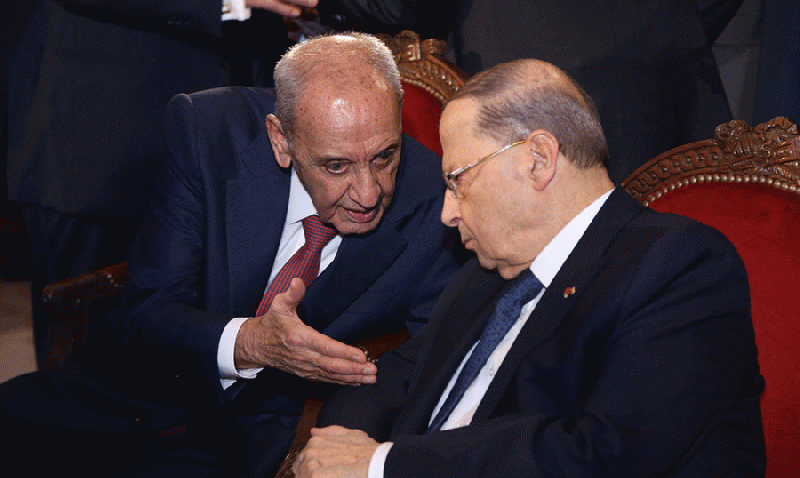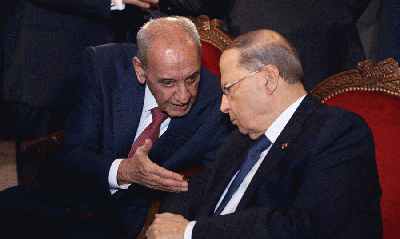The change deputies have begun negotiations with the larger blocs in the council, amidst the entry of committees and discussions about a new government. Political sources following the developments revealed to "al-Liwaa" that there are off-the-record contacts and movements aimed at agreeing on the name of the next Prime Minister and the shape and composition of the government. They pointed out the differences between the Shiite duo and the head of the Free Patriotic Movement, Deputy Gebran Bassil, regarding the name of the figure who will lead the formation of the new government. While the Shiite duo, the Democratic Gathering, and others prefer reassigning Mikati to form the upcoming government in the same fashion as the current one, this option enjoys French support and a Gulf oversight for various reasons, most importantly that its head has the support of Sunnis, is acceptable on a national level, and that the government still has more than one sensitive file that requires follow-up, such as completing the final agreement with the International Monetary Fund, the broad outlines of which have been agreed upon along with its preliminary format. The new government still has the task of adhering to four main conditions for the Fund to approve the final agreement and sign it with Lebanon, which include: 1) approving the general budget, 2) approving the capital control project, 3) restructuring banks, and 4) implementing necessary reforms across various sectors and public institutions, especially in electricity.
The sources further add that the issue of reviving the electricity sector also falls within the responsibilities of the new government, based on what the outgoing Prime Minister Najib Mikati stated recently, that he awaits from the Minister of Energy, Walid Fayyad, to hand him a comprehensive file to assign new electricity plants to discuss with President Michel Aoun and decide on the necessary executive steps to swiftly implement quick administrative and other measures, especially since Lebanon has received offers from some of the world's leading companies.
Conversely, it has been noted that Deputy Gebran Bassil from the Free Patriotic Movement opposes reassigning Mikati to form the new government, expressing numerous negative observations about him, as he did not meet many of his demands and procedures, as conveyed by sources from the Free Patriotic Movement, but always faced these requests with rejection. The sources indicate that Bassil attempted to promote one of the World Bank experts, who arrived in Beirut last week and toured political and religious figures to gauge their opinion on the possibility of becoming the new Prime Minister, but he was unsuccessful and faced outright rejection.
Sources relayed that Bassil affirmed in his discussions and before his supporters that he supports forming a new government quickly so that it can take on its mandated tasks, contrary to all contradictory claims, and insists that it be a political government to secure a place for himself in it, aiming to take over the Ministry of Energy, which he is keen to hold personally, to meet the vast funds that will be spent on the recovery and assignment of plants under his oversight and the well-known Aoun group, and he will also handle the issue of oil and gas exploration since the new government could assume presidential duties in case the presidential elections are not held on time. In contrast, the outgoing Mikati-led caretaker government will not be constitutionally authorized to fulfill presidential duties in the event of a vacancy, in which case the Speaker of the Parliament, Nabih Berri, would be mandated to perform presidential tasks, a situation we are cautious of encountering.
In this context, there seems to be an affinity between the first and second presidencies concerning the election of a member of the Strong Lebanon Bloc (the Aoun bloc) as Deputy Speaker of Parliament, which he faced with "a pure heart" against his re-election for a seventh term. This "presidential warmth" could lead to Deputy Ibrahim Kanaan returning to the head of the Finance and Budget Committee and cooking up committees with the dough of the agreement between the Shiite duo and the Free Patriotic Movement and his electoral bloc in forming the committees, culminating in the binding consultations. Nevertheless, there is no objection from the council's team for change deputies and even from the Strong Republic Bloc, such as Deputy George Adwan to head the Administration and Justice Committee, similar to the situation in the council back in 2018.
In numerical calculations, the March 8 team, if they consolidate their papers, guarantees naming a possible candidate for the premiership as follows:
1. Development and Liberation Bloc: 15 deputies.
2. Northern Parliamentary Meeting: 65 deputies, at least 3 of whom may join the March 8 team.
3. Strong Lebanon Bloc: 17 deputies.
4. Loyalty to the Resistance Bloc: 15 deputies.
5. Independent National Blocs: 3 deputies.
6. Armenian Bloc: 3 deputies.
7. Project Association: 2 deputies.
8. Independents: 4-5 deputies, totaling at least 62 deputies in solidarity and complementarity.
As for the other forces, the cohesive bloc is the Lebanese Forces Bloc with 19 deputies, totaling 27 or 28 deputies from the change and independent members, plus 4 deputies from the Kataeb Bloc and 2 from the Independence Movement, amounting to a total of 52 deputies, remaining the Socialist Party with 8 deputies, which forms the "weight" in the upcoming two deadlines. If it joins the opposition bloc, the sum becomes 60 plus one from the Islamic Group plus 3 northern deputies. In the process of reshuffling parliamentary cards, the image appears close, and calculations are influenced by individual interests and accounting for balance or implications that can motivate the deputies.
The General Secretariat of the Parliament submitted a list of deputies based on their respective blocs to schedule appointments after announcing the commencement of consultations for forming a government. While the parliamentary blocs, regardless of their denominations, appear as a "parliamentary cement" resistant to singing outside the flock that brought them in and moves them, the focus of these blocs is on the deputies elected on October 17, or what is called the change deputies or independents, hoping to weave alliances with them or lure them into their options, whether related to electoral slogans or those beforehand. The Deputy Speaker Elias Bou Saab expected that forming the government would be a challenging process, suggesting a government of specialists. He revealed ongoing communications to cooperate on forming the parliamentary committees.
Official preparations have practically begun for holding binding parliamentary consultations to appoint a new Prime Minister alongside preparations for electing the parliamentary committees in the upcoming Tuesday session, where the General Secretariat of the Parliament submitted a list of deputies based on their parliamentary blocs and independent deputies to the General Directorate of the Presidency of the Republic. Follow-up sources confirmed to "al-Liwaa" that the General Directorate received the list, and coordination was in place between the General Secretariats of both presidencies since the election of the Parliament bureau, and invitations will be prepared for the blocs and deputies promptly without delay, due to the necessity to expedite naming a Prime Minister and forming the government.
In this context, the "Progressive" Party announced in a statement that, after a meeting and consultation, it decided to nominate Deputy Najat Aoun for membership in the Environment Committee in addition to the Education, Higher Education, and Culture Committee, and Deputy Mark Daou for membership in the Finance and Budget Committee and the National Economy, Trade, Industry, and Planning Committee, continuing the parliamentary work and based on our electoral program, where the priority now is to halt the ongoing collapse and uplift the country. In the same context, the party tasked its deputies with urgently proposing the establishment and activation of the following special parliamentary committees:
- Establishing a special committee for recovery plans and relations with donors.
- Activating a parliamentary investigation committee in the banking sector and depositors' funds.
- A parliamentary investigation committee for negotiating the maritime border delineation. Deputy Daou told "al-Liwaa" that other groups in the change bloc will submit requests for membership in other committees that have been identified and will be announced by those concerned. However, regarding the two committees he will run for, the Finance and Budget Committee, and the National Economy, Trade, Industry, and Planning Committee, there are priorities he will work on that include approving three important and urgent laws currently in the council: the approval of the 2022 budget law, the capital control law, and amending the banking secrecy law—even though he opposes this law, insisting that banking secrecy should be completely abolished.
Daou added: There’s a law that the government should have proposed, which is the law for restructuring the banking sector, and we will push towards completing it. He clarified that he will work on specific matters to rescue the economy, including managing the crisis by increasing local production and restructuring the economy. Meanwhile, Deputy Aoun stated to "al-Liwaa" that the nomination of change deputies for committee membership is a normal thing in the context of establishing a new style of democratic work in the parliament, and we hope that the parliament presidency and bureau will consider that there are new methods in parliament work that will take place to achieve the required change.




